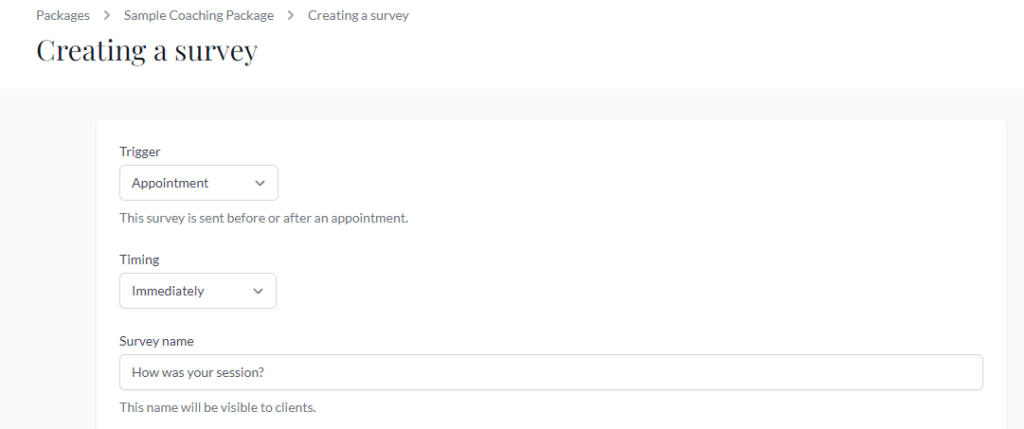So you’ve landed a solid roster of coaching clients and are starting to grow your business.
Congrats!
But unless you’re already experienced with running a service-based business, you’ll start to notice that client management becomes more difficult as you onboard more and more clients!
Client management is more than just scheduling calls and sending messages. It’s about building relationships and making sure clients are happy and satisfied.
With that being said, let’s explore how client management works and the skills needed for it. Read on to discover:
- What client management is
- 6 crucial client management skills for coaches
- Paperbell: the solution for easy client management
- The benefits of client management for life coaches
- Tips for effective client management
What Is Client Management?
Client management is an effective process of nurturing and maintaining relationships with clients, which leads to business growth and success in the long run.
It also involves using various strategies and techniques to help you understand and meet the needs of your coaching clients throughout the entire duration of their engagement with you.
Its various stages include:
- Initial contact and onboarding
- Maintaining regular communication
- Addressing concerns or inquiries
- Providing support
- Ensuring overall client satisfaction
For life coaches, it’s a multifaceted process that includes every interaction with clients.
In short, client management starts from the moment potential clients express interest in your coaching services!
A critical component here is quality client care – for instance, ensuring that all your interactions with clients adhere to high standards to provide maximum satisfaction.
Building relationships
A huge part of client management is building relationships and rapport with every coaching client.
The main goal is to nurture strong client relationships and, over time, build increased loyalty. This involves investing time not only during scheduled sessions but also outside of them.
Reaching out occasionally, checking in, or sending personalized messages on special occasions significantly boosts client retention rates by making them feel genuinely cared for.
Here’s an example: my goal with any coaching client is to make sure clients don’t need to be the first to reach out to me (unless something specific comes out of the blue). I aim to check in with them often enough that they never feel I’ve dropped the ball on them.
Technology in client management
Many aspects of client management can be automated using software tools like client relationship management (CRM) systems.
These provide operational capabilities such as appointment scheduling and tracking, making managing clients more efficient than ever before.
Apart from the basic functions, such platforms also let you customize communications according to each individual’s preferences. This can improve the quality and efficiency of your interactions with current clients.
You can also add other communication tools to your roster, such as Slack or Voxer.
Client retention & satisfaction
Another important facet of managing clients involves measuring client satisfaction through techniques like surveys or feedback forms after each interaction.
For example, you can automatically set up emails with feedback surveys after every single coaching session with Paperbell:

These insights are invaluable for improving your services to meet clients’ needs better. But when done right, it can automate repeat business and referrals.
Additionally, the gathered insights will help in your copywriting and messaging to attract new prospects and turn them into loyal clients. Plus, it can be a smart idea to share an easy-to-edit recommendation letter template with your clients.
What are the Challenges of Client Management for Life Coaches?
Let’s be honest: managing multiple clients can feel like juggling flaming torches while riding a unicycle! Here are some common struggles that coaches can deal with when they’ve got a full roster of clients.
1. Juggling multiple clients simultaneously
The more your clientele grows, the trickier client management becomes!
This complexity is compounded when dealing with large numbers simultaneously and trying to remember intricate details about each one without proper client service standards in place.
I used to have client notes scattered across Gmail, Trello, Google Keep, Slack, and a paper notebook.
Never again.
2. Maintaining personalized service
Beyond handling a bunch of clients at once, maintaining personalized service also becomes difficult. Each individual client requires unique attention and tailored solutions based on their specific goals.
That’s what coaching is all about.
Some coaches resort to group coaching to fix this issue. But you can also simplify your suite of offers and develop your own coaching program and process to streamline the way you help your clients!
3. Data tracking and organization
Another challenge comes from tracking and organizing data for each client interaction, from appointment schedules to payments received or pending, all the way to important points noted during sessions or calls.
Managing this information can quickly become overwhelming if you’re not using efficient CRM software tools that are readily available today.
But even if you are using these tools, it can make the problem even worse if they’re all disconnected from each other.
Handling 5-10 clients on a blend of Paypal, Calendly, Trello, Zoom, Gmail, and Typeform or typeform alternatives just hits different compared to running everything from a single platform (hint hint – like Paperbell).
4. Balancing business development with current client needs
And let’s not forget the balancing act of managing your growth aspirations while also meeting the needs of your current clients – a challenge that many small businesses, including life coaches, often face.
You’re no longer an employee. In addition to all your client work, you also need to work ON your business!
Striking the right balance is key. You need to attract potential clients with well-crafted marketing campaigns while making sure your existing clients feel valued through timely and personalized communication.
The right balance is different for everyone. You’ll need to experiment to see what works for you.
Here’s the important thing to remember:
Don’t sacrifice client care to spend all your time marketing. But don’t completely drop marketing once you land a client, either.
Otherwise, you’ll end up back in feast and famine once you lose a client!
Benefits of Client Management for Life Coaches
Client management does come with its challenges, but the benefits are definitely worth the hassle. Let’s explore why.
1. Streamlined operations
By implementing a comprehensive client management process, you can simplify your daily operations and free up time to focus on coaching.
This consolidation significantly reduces administrative workloads and allows you more time to spend on coaching activities themselves… which is what you’d rather be doing, am I right?
2. Increase your rates
Once you’ve mastered client management, you can offer a better coaching service overall.
And a more valuable service also means you can charge more!
Of course, client management alone won’t make your coaching offer more valuable. But it’ll certainly help you support your clients as they achieve massive transformation, which is what truly matters if you want to increase your rates.
3. Promote client loyalty
Cultivating strong bonds between coach and coachee fosters deep loyalty among clients, which is a critical factor in the success of any business… but especially coaching!
Clients who feel they’re in good hands with you will want to stick around for longer. And they’ll give you raving testimonials, too.
6 Crucial Client Management Skills for Coaches

At this point, you get why client management matters – and why it’s so dang hard!
So let’s cover some skills you can work on to make client management easier.
1. Communication
Above all else, clear communication is the cornerstone of managing clients.
This involves not only articulating your thoughts with clarity but also actively listening to understand their experiences or concerns better.
Open communication builds trust and strengthens the client-coach relationship, which creates a positive environment for mutual growth and success.
2. Empathy
To establish deeper connections with your clients, empathy plays an integral role. It allows you to understand their feelings and perspectives, which can pave the way for trust-building.
It requires active listening and putting yourself in others’ shoes to grasp their emotions fully so you can respond appropriately and provide genuine support.
Empathy is not just about fixing problems or offering immediate solutions but rather about being present and showing understanding.
3. Organization
An organized approach to scheduling appointments and tracking progress among multiple tasks ensures that no detail gets overlooked.
It also mitigates scheduling issues!
Being organized boosts your productivity and lets you focus on achieving your goals – instead of making you lose a bunch of time looking for “that one email”.
4. Adaptability
It’s important, as a coach, to adapt your strategies based on individual needs because each client comes with a unique set of goals and expectations.
Being adaptable means being flexible yet focused on achieving desired outcomes.
It’s about embracing change, staying open-minded, and stepping out of your comfort zone to tackle new challenges!
Not a bad skill to have, no matter your niche.
5. Problem-solving abilities
Challenges are part of the coaching journey, whether they’re personal issues faced by the client or related to setting and meeting targets at the start of the program.
That’s why having problem-solving capabilities helps you identify and overcome obstacles efficiently.
It isn’t just about offering support – it’s about being a problem-solver and empowering your clients to overcome their hurdles and come out stronger on the other side.
6. Technological proficiency
Let’s face it – being comfortable with technology is essential for life coaches who operate online.
The use of technology simplifies client relationship management, period.
So, being tech-savvy is not just an advantage – staying relevant and competitive in the coaching world is necessary.
Tips for Effective Client Management
Skills are a big part of becoming better at managing your coaching clients. But let’s cover some additional tips you can implement right away!
1. Provide personalized service
A critical part of successful client management lies in providing personalized service. Every client has unique needs and objectives, so you want to shape your approach to suit these individual requirements.
This could involve tailoring the structure of coaching sessions or creating bespoke action plans based on each person’s specific goals.
Even if you have set coaching packages, you should still take the time to understand every client’s needs and goals in detail before giving them a plan of action.
If you want to give your clients cookie-cutter solutions, you’re better off selling them digital products, such as a digital planner.
2. Prompt response to inquiries or requests
Your clients value timely responses. It shows that you respect them and their investment in this relationship.
Whether they have queries related to appointments or payment methods, or they need further clarification from a session discussion, ensure you’re readily available to assist them promptly.
Emails should ideally receive replies within 24 hours while missed phone calls should be returned by the end of the day.
With that being said…
You may have different boundaries. If that’s the case, it’s important to clarify this with your clients so that expectations don’t get mixed up.
Client dissatisfaction typically happens when there’s a disconnect between what a client expects and what they get. So if you respond within 48 hours, but they already expect that to be the case, they’re less likely to be dissatisfied.
3. Maintain accurate client information
Consistently delivering top-notch coaching services requires having accurate information at hand whenever it’s needed.
And this is especially true with coaching since you’ll be asking your clients tons of questions. Unless you can remember everything they tell you, make sure to track your notes in a way you can refer back to them easily.
You should also keep track of how many appointments a client has left. Or, you can use Paperbell to automate that part for you.
Oh, and if a client changes their email address or phone number? Make sure to update that info in your CRM so you don’t run into communication problems further down the road!
FAQs About Client Management
How do I manage client communication?
You can effectively manage client communication by using a dedicated CRM system, scheduling regular check-ins, and maintaining clear, concise correspondence.
What strategies can I use to ensure clients are satisfied with my services?
To ensure client satisfaction, provide personalized coaching service, set realistic expectations from the start, and consistently deliver on your promises. Regular feedback (with coaching surveys) is also crucial.
How do I track progress and results for each client?
You can track progress by setting measurable goals at the outset of your coaching relationship. Progress tracking will depend on which coaching model you’re using.
What tools can help me better organize and manage my clients’ data?
A CRM such as Paperbell offers features like appointment scheduling, automated emails, payment portals, and client support tools that make client management and data organization much easier.
How can I effectively set expectations with new clients?
In initial meetings, discuss their goals clearly. Provide an overview of what they should expect from you as a coach, including how often you’ll meet and the methods used for tracking progress.
Grow Your Coaching Business by Implementing Effective Client Management
Client management is all about building and maintaining relationships, tracking progress, and providing unwavering support.
Your skills in this area are vital – they can make or break your client’s experience with you.
The benefits? Streamlined operations, more referrals, repeat clients, raving testimonials, and better service for your clients. A win-win situation!
Implementing it effectively calls for robust systems like appointment scheduling tools and client account management.
Paperbell could just be the solution you’ve been looking for when it comes to managing those tricky moving parts of client management. It’s simple yet powerful – perfect for coaches ready to take their business up a notch without overcomplicating everything.
With Paperbell, running a coaching business online and managing your clients has never been easier! Grab your free account and see how much time you can save each week.









